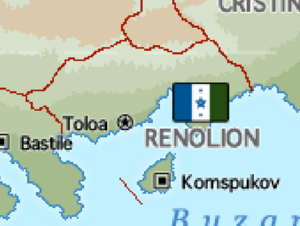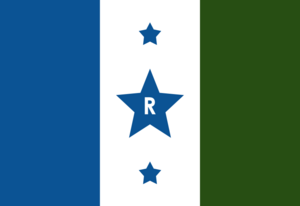Renolion
The Kingdom of Renolion | |
|---|---|
|
Flag | |
| Motto: "For you and me, a country that is free | |
| Anthem: The Song of Angels | |
 | |
| Capital | Toloa |
| Largest | Komspukov |
| Recognised national languages | Sivechi, Anglish |
| Demonym(s) | Renolions |
| Government | Federal parliamentary semi-constitutional monarchy |
• King of Renolion | Louis Fruschevi II |
• Leader of Parliament | Cipriano Bascio |
| Legislature | National Parliament |
| Establishment | |
• Kindgom officially formed | March 18th, 1687 |
• The Pizati Riot occurs | January 23rd, 1926 |
| Area | |
• Total | 110,600 km2 (42,700 sq mi) |
| Population | |
• 2022 estimate | 37,458,992 |
• 2021 census | 37,120,367 |
| GDP (nominal) | estimate |
• Total | $552 billion |
• Per capita | $14,873 |
| Currency | Siloca (SIL) |
| Time zone | UTC +8 |
| Date format | dd/mm/yy |
| Driving side | right |
| Calling code | 87 |
| ISO 3166 code | REN |
| Internet TLD | .re |
The Kingdom of Renolion, colloquially known as Renolion, is a country in south Europa on Eurth. Located on the coast of the Byzantine Sea, Renolion experiences dry and hot summers, with humid and warm winters. The Northern half of the country consists of large steppes and mountains, famous for their high coal content, while the lower half of the country is largely urban sprawl, with large beaches acting as the home of the nation's shipping industry.
The Kingdom was founded in 1687 after King Resvichesko I successfully unified the Northern Kingdom of the Grande Steppe with the Southern Kingdom of Verecehchi. From 1670 to 1850, the nation grew both in strength and union, efforts between the two unified kingdoms beginning to create the early concept of the Renolion nationality. The First Kingdom, which functioned as an absolute monarchy, would last until 1872 when a series of riots forced the holding of a national referendum, in which the National Parliament was first founded. This system permitted the monarch to maintain a chunk of power for larger affairs, while the Parliament took over the management of smaller regional laws and other miniscule quarrels. From 1926 to 1966 the nation entered the Silent Era, in which the nation became stagnant, working internally and avoiding international affairs. The nation reached it's current territorial peak in 1967, after the annexation of the island of Rechevvi in the aftermath of the Five Week War, which brought a end to the Silent Era and saw the birth of the Great Revival.
As of 2022 the nation's main exports are oil, coal, and grain. Organized crime, mainly illegal moon shining operations, are currently rampant, with the nation's police force doing their best to curb the sale of illegal alcohol. Labour reforms are also underway in the nation's north, as miner's wages have hit their most stagnant point, which has led to some level of tension between labour union's and mine owners.
History
Early Modern History
In 1686, Arthur Resvichesko travelled as a knight for hire, working both for the Kingdom of Verecehchi and the Kingdom of the Grand Steppe, gaining a reputation for being able to complete any task awarded to him. This reputation also spread to his public reputation, as most of his fortune was spent on public works in local communities in the two kingdoms, which began to grown his public support. By 1687, he presented both the of the two kingdoms monarchs with a proposition, a unification between the nation's two halves. Under the belief that with the south's coastal trade access and the north's raw resources it could create a grand nation that could stand among the giants of the world, and believing his words to be true, the two parties agreed to the idea. Agreeing to step down from power, the monarchs selected Resvichesko as their replacement, and he was crowned a week after the agreement, on March 18th, 1687.
20th Century
The years of 1900-1925 would prove largely beneficial for the Kingdom, as under the rule of King Resvichesko IV and the parliamentary leadership of Enrico Laterza the nation's economy would rapidly grow, and the National Shipping Bill would fuel the creation of the nation's passenger shipping industry. Laws such as the Montegra Negra Act and the Cesarini Reformation Bill would see the nation's populous achieve record high standards of living. However, slow progress of the Labour Reform Bill of 1925 would begin to cause frustration among both, as both moderates and radicals in Parliament and in the public would begin to claim that it was intentional sabotage on behalf of the conservationists and monarchists. This boiled over on January 23rd, 1926, when in the largely industrial city of Pizati became the birthplace of the Riot of Pizati, still referred to in some circles as the Battle of Pizati. This ordeal left communism in poor taste, as much of the steel sector was destroyed by the affair, and the majority of casualties were pinned on communist forces. By 1932, communism was banned nationwide, and has remained a largely underground ideology.
The years immediate to 1926 became known as the Silent Era, as the nation entered a stagnant period, but with no true notable events occurring. The period was marked mainly by sweeping infrastructure overhaul programs, and a series of popular monarchs. However, it was also during this time that the Republic of Rechevvi first came into public conscience, as they began to make displeased remarks about the city of Komspukov, a Renolion port founded in 1847 before the island's borders were officially published, which left the island as 1/4 Renolion territory, 3/4 RoR territory. Things reached a head in 1967 in which the Five Week War would begin. In the aftermath, the island of Rechevvi was annexed, bringing the nation's territory to its current size. From 1968 onwards, the nation would enter a period known as the Great Revival, in which deregulation of certain business such as copper and iron mining allowed for unchecked economic expansion, with the average wave climbing drastically in comparison to the Silent Era. Its effects can still be felt today.
